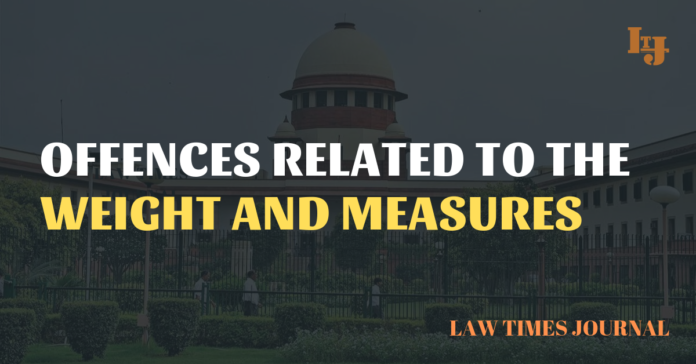
To safeguard the interest of consumers, consumer law known as Consumer Protection Act, 1986 has been enacted but criminal law is more concerned and active so it is used as a measure that deters traders and producers from engaging in certain types of trading abuses. While civil remedies provide compensation for the harm suffered by consumers, criminal law prohibits undesirable trade practices which vitiates proper business dealings.
The Indian Penal Code, 1860 provides for the offences relating to weights and measures from Sections 264 to Section 267 under Chapter XIII. Section 264 specifies the offence which is committed by the usage of false instrument for weighing with intention of deceiving the customer. Such person with fraudulent intent committing offence under Section 264 shall be punished with imprisonment which may be either for a period which may extend to one year or with fine or both.
Another offence under Section 265 mentioned in relation to weights is, fraudulently using false weights and false measures of length and capacity or usage of false weights and false measures as a different weight or measure from what it is, shall be punished with imprisonment which may be either for a period which may extend to one year or with fine or both.
Owning and possessing has a huge difference and in criminal law even possession of an article which is against public policy is made punishable. Section 266 deals with the commission of offence regarding possession of false weighing instrument or false weights of any measure of length or capacity, which the offender knows to be false and does it with deceitful intent is liable for the punishment with imprisonment which may be either for a period which may extend to one year or with fine or both.
The persons involved in producing or making, selling or disposing the instruments used for weighing or the weights used to weigh the goods or any measure of length or capacity which he knows to be false but uses the method of deception to make it true shall be punished with imprisonment which may be either for a period which may extend to one year or with fine or both according to Section 267 of Indian Penal Code.
Illustration
Suppose a person A, possess a weighing instrument of rice which measures inaccurately the quantity of 1 kilograms of rice as 800 grams which makes the business transaction as an offence under Section 266 of Indian Penal Code and A is liable for the punishment with imprisonment which may be either for a period which may extend to one year or with fine or both.
Offences in reference to weights and measures in New Jersey
Weights and Measures (Jersey) Law 1967
Under Part 3 of WEIGHING AND MEASURING FOR TRADE, Article 15(1) deals with the offences in connection to equipment used for trade and states that if any person uses for trade or has in the person’s possession for use for trade, any weighing or measuring equipment which is false or unjust, the person shall be guilty of an offence and the equipment shall be liable to be forfeited. Under Article 15(3) it provides for the commission of fraud in the using of any weighing or measuring equipment for trade, the person committing the fraud and any other person party thereto shall be guilty of an offence and the equipment shall be liable to be forfeited.
The Standards of Weights and Measures Act, 1976 has attempted to set right many of the inadequacies found in the Penal Code. It provides for tampering with or alterations of any reference standard, secondary standard, or working standard, other than correctional purposes is punishable with imprisonment for a period which may be increased to two years or with fine which may extend to five thousand rupees, or with both.
Gopilal Agarwal v. State of Orissa[i]
The appellant was prosecuted and punished for infringement of the standards quality of ‘gudakhu’. The Orissa High Court held that since no quality standards has been prescribed for ‘gudakhu’ by the Act and the rules, the penalty imposed was unsustainable.
Frequently Asked Questions (FAQs)-
1. What are the ingredients to invoke offence under Section 264 of Indian Penal Code?
To invoke Section 264 of the IPC, it must be proved that –
(1) The accused took help of an instrument for weighing the materials;
(2) The accused must have the knowledge of the instrument being used as a false or defective in nature; and
(3) The accused must have used it intentionally.
[i] A.I.R. 1973 Ori 15
Indian Penal Code , 1860, No. 45





